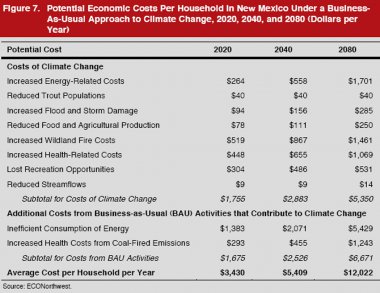 EUGENE, Ore. -- (Feb. 17, 2009) -- If nothing is done to reduce greenhouse gas emissions, New Mexico, is likely to experience some $3.2 billion in associated costs -- led primarily by wildfires and health-care. This could translate to an individual tab of about 8 percent of annual household income by 2020, according to a report produced for the University of Oregon's Climate Leadership Initiative's Program on Climate Economics by ECONorthwest.
EUGENE, Ore. -- (Feb. 17, 2009) -- If nothing is done to reduce greenhouse gas emissions, New Mexico, is likely to experience some $3.2 billion in associated costs -- led primarily by wildfires and health-care. This could translate to an individual tab of about 8 percent of annual household income by 2020, according to a report produced for the University of Oregon's Climate Leadership Initiative's Program on Climate Economics by ECONorthwest.
In addition, the report warns, "continuing with the activities that contribute to climate change potentially could cost New Mexico almost $1.3 billion per year in missed opportunities to implement energy-efficiency programs and about $275 million per year in health-care costs from burning coal." Combined total costs, under a "business-as-usual" approach to climate change would jump six-fold, to $18.4 billion, by 2080.
The UO's Program on Climate Economics is guided by a steering committee of 19 academic and private economists from New Mexico, Oregon, Washington, Arizona and other western states. Committee members also produce some of the program's research. The report's lead author, Ernie Niemi, is a principal with ECONorthwest, a fellow with the Climate Leadership Initiative (CLI) and a steering-committee member. ECONorthwest was contracted to produce the assessment.
Based on three recent international reports, major climate changes New Mexico will face include more frequent wildfires amid prolonged heat waves, significant reductions in precipitation except for northern regions where increases are anticipated and increased seasonal droughts and floods. Hotter weather -- with summer temperatures rising up to 12.6 degrees Fahrenheit over current averages by 2080 -- would increase air-conditioning costs, health-care complications and the state's death rate, especially for residents without access to home cooling.
 "Our research found that a failure to reduce greenhouse gas emissions would produce significant and continually rising costs for New Mexico households and businesses," said Bob Doppelt, CLI's director, who managed the report. "There will be no business-as-usual economy in New Mexico under a business-as-usual approach to climate change."
"Our research found that a failure to reduce greenhouse gas emissions would produce significant and continually rising costs for New Mexico households and businesses," said Bob Doppelt, CLI's director, who managed the report. "There will be no business-as-usual economy in New Mexico under a business-as-usual approach to climate change."
"Our assessment shows that climate change will impose many different types of costs on the citizens of New Mexico," Niemi said. "We anticipate health-related costs of almost $421 million, wildfire-related costs of $488 million and energy-related costs of $248 million per year in 2020."
The $3.2 billion price tag for 2020, which researchers say is a purposely conservative understatement, is based on 19 potential costs in 10 categories for which researchers had sufficient data to draw conclusions. Researchers also listed another 19 significant environmental consequences for which they had insufficient information to include in the report.
Per-household costs -- $3,430 for 2020, $5,410 for 2040 and $12,000 for 2080 -- are based on projected population growth and were computed to spell out the cost of inaction on a personal level, not as a recommendation of actual cost-sharing. The totals for the three years translate to 8 percent of median household earnings in 2020, 13 percent in 2040 and 29 percent in 2080.
The report assumes that New Mexico, like many other states and countries, will not pursue "effective actions to rein in emissions of greenhouse gases, logging of native forests, and other factors that drive climate change." The report also considers "the costs households and businesses would incur by continuing with technologies and behaviors that inefficiently use energy, even though more efficient alternatives are available at little or no cost."
"The preservation of water and forests is critical to New Mexico's economy and may be at risk due to climate change. The costs related to health and wildfires, recreation and ecosystem effects are likely significant, and not fully accounted for in this analysis," said Kristine Grimsrud, a member of the steering committee of CLI's Program on Economics and professor of economics at the University of New Mexico. "Thus, the losses to the New Mexico economy are likely even higher since many known costs have not yet been quantified."
"While emphasis has been placed on the impact of programs to mitigate greenhouse gases, estimating the impact of maintaining the status quo has been over looked. This report provides a first step in filling that gap," said Janie Chermak, also a member of the program's steering committee and professor of economics at the University of New Mexico. "While different groups may quibble over the 'right' estimates or numbers, this report surely shows that the costs of maintaining the status quo are not trivial."
Projected total annual costs of business as usual in New Mexico for 2020 ($3.2 billion), 2040 ($6.3 billion) and 2080 ($18.4 billion) are based on:
• Increased energy-related costs: $248 million (2020); $647 million (2040); and $2.6 billion (2080)
• Reduced trout populations: $38 million; $46 million; and $61 million
• Reduced food and agricultural production: $73 million; $129 million; and $382 million
• Increased health-related costs: $421 million; $759 million; and $1.6 billion
• Lost recreation opportunities: $286 million; $563 million; and $812 million
• Increased wild-land fire costs: $488 million; $1 billion; and $2.2 billion
• Increased flood and storm damages: $88 million; $181 million; and $435 million
• Reduced stream flows: $8 million; $11 million; and $21 million
• Inefficient consumption of energy: $1.3 billion; $2.4 billion; and $8.3 billion
• Increased health costs from coal-fired emissions: $275 million; $527 million; and $1.9 billion
Some of the categories are broken down into more specific components in the report.
Complete sources for data collection and analyses are detailed in the report, which is available directly from the UO's Media Relations Web site (click here) and at CLI's Program on Economics Web site.
In addition to New Mexico, separate reports were issued for Oregon and Washington. The reports were prepared by Niemi, Mark Buckley, Cleo Neculae and Sarah Reich, all of ECONorthwest, with assistance from members of the Advisory Committee on Climate Economics.